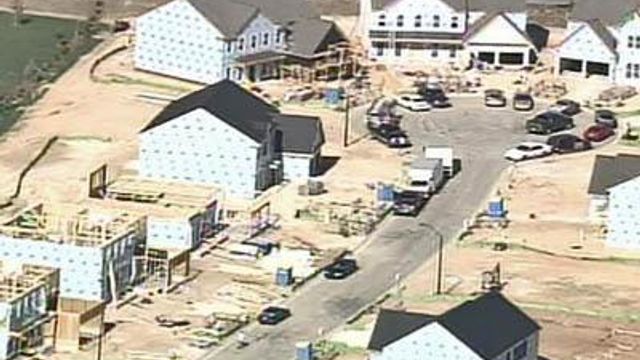No Water Could Mean No New Homes in Raleigh
Raleigh could implement strict water restrictions as early as next week that not only will limit how much water residents and businesses consume, but also might turn off the spigot on new housing developments.
Posted — UpdatedFalls Lake, the city's primary reservoir, has about 98 days of drinking water left, and City Manager Russell Allen has been empowered to enact Stage 2 water restrictions once the water supply falls below 90 days.
The Stage 2 rules would ban outdoor watering and pressure-washing, allow only car washes that have been certified as using recycled water to operate and require hotels and restaurants to encourage customers to cut down on water consumption.
The rules could also slow down development. Developers who get permits to build water lines after Stage 2 begins would have to wait until Stage 2 restrictions end to get their water lines flushed to test for bacteria. Flushing the lines is a required step for homes and buildings to get their Certificate of Occupancy. The flushes can consume 10,000 to 15,000 gallons of water per development.
Developers that get permits to build water lines after Stage 2 restrictions begin might hit a roadblock, said Tim Minton, executive vice president of the Home Builders Association of Raleigh-Wake County.
"It would basically put new subdivisions on hold," Minton said. "That's our concern – what is the long-term effect? Where are we going to be three to six months from now?"
City officials said they hope Stage 2 restrictions won't have significant impacts.
Subdivisions that already have permits will move forward, and their water lines will be flushed, said Ed Buchan, a water conservation specialist with Raleigh's Department of Public Utilities. Developers without permits can still build the water lines and wait until Stage 2 ends to continue, he said.
"Obviously, everyone is concerned now. This is the most severe restrictions to be in," Buchan said.
Construction delays caused by the tougher water restrictions could adversely impact a housing market already slowed by the nationwide mortgage crisis, Minton said.
"It's probably the most important issue we're facing today, and the best thing we can do is pray for rain," he said.
The housing market generates about $4 billion a year for Wake County's economy, Minton said. Mike Walden, an economist at North Carolina State University, said the real estate industry accounts for about 12 percent of the regional economy.
• Credits
Copyright 2024 by Capitol Broadcasting Company. All rights reserved. This material may not be published, broadcast, rewritten or redistributed.






